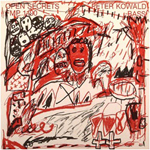|
|
 |
Dusted Reviews
Artist: Peter Kowald Album: Open Secrets Label: FMP Review date: Mar. 24, 2009 |

|
|
|
 |
Peter Kowald declared in the last interview of his life that he wasn’t a good jazz musician. This may seem bizarre coming from one of the first brave wave of European free jazz musicians, someone who had played with Peter Brötzmann, the Globe Unity Orchestra, and the Spontaneous Music Ensemble before the leaves turned at the end of the summer of love. Then he goes on to recite a litany of other things he could not play well – flamenco, raga, Japanese flute music – this from a man who improvised with musicians all around the world and once formed an international ensemble called Global Village. Perhaps Kowald was just a modest sort, but one thing you can say for sure is that he was a bass player. He gladly learned from any genre and any one, but rather than mimic what he heard, he turned it all into bass music. The anagramic title of this record’s first track is “Peek At World,” which is one reason why Open Secrets (which was released in 1988 but has only just now made it to CD) is so much more communicative than your average free improv solo recital. You can hear a world of experience boiled down to what can be sounded within a curved wooden box and four big strings.
Turns out that box, too often confined to the role of supplying a foundational rumble or a steady groove, holds a lot of sound – sound Kowald knew how to summon and shape to his will. But showing off isn’t on the agenda; this record’s nine tracks are marvelously focused, the musical ideas succinctly articulated, the soul behind them ever evident. The arco showcase “Archaion Mellon” proceeds with striking confidence from bowed slurs to a rapid-fire, yet extremely precise tattoo that marks out a melody, and then refuses to resolve it so much as slam it shut. “Vita Povera – Arte No’s” single notes, simply plucked and soulfully bent, hint at the blues, yet there’s not a whiff of American sorrow about them.
Kowald was tuned into something ancient, something that worked through him more than he through it. In less than a minute and a half, “Welt Um (Wale)” quietly opens up the earth and lets out a black shadow; still short at twice that length, “Ima Samu Dessu (Mi Tsu Ni)” pairs long tones with throat singing to disperse that blackness into the cosmos. There’s a calm in these performances that contrasts with the frenzy elsewhere in Kowald’s discography and makes it feel even more special.
By Bill Meyer
|







